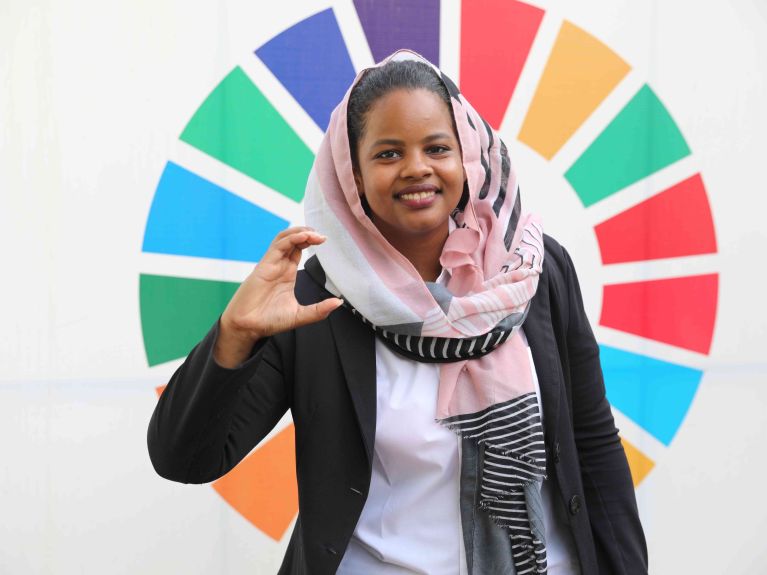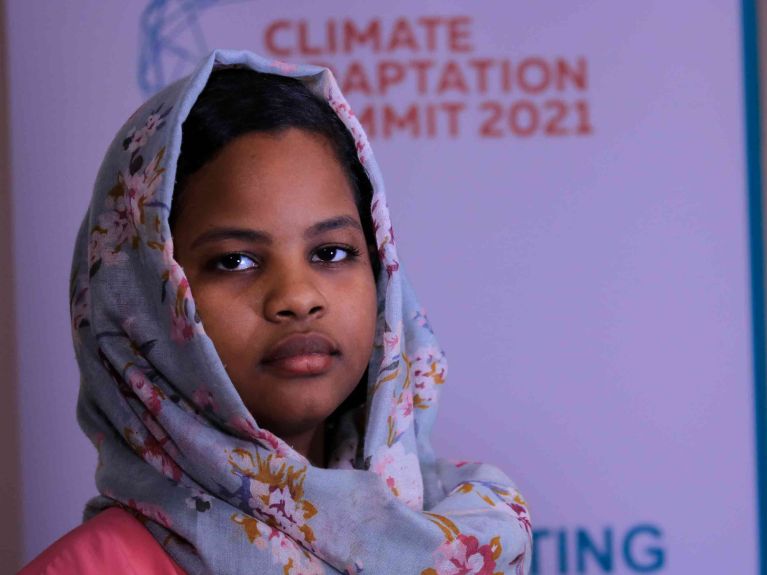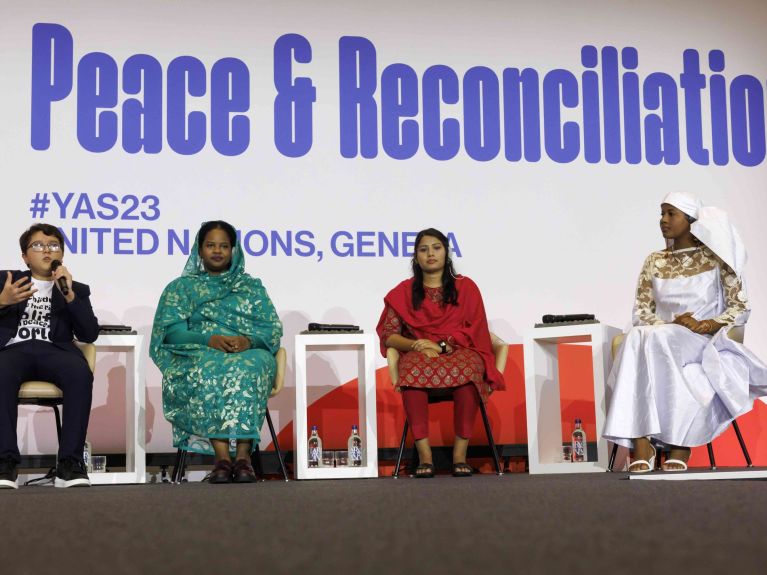“Climate change is the major factor in conflict”
Nisreen Elsaim is a climate change diplomat and is working in Berlin as a Richard von Weizsäcker Fellow. She talks about her commitment and her time in Germany.

Nisreen Elsaim has already advised UN Secretary-General António Guterres on climate change strategies and was honoured by French President Emmanuel Macron for her commitment. Then she had to leave her home country Sudan with her son. The 30-year-old activist has striven for greater climate justice since 2012 and looks back on an eventful decade. In 2024 she is living and working as the Richard von Weizsäcker Fellow at the Robert Bosch Academy in Berlin.
Elsaim studied Physics and Renewable Energies at university in Khartoum, the Sudanese capital, and subsequently held several positions at the United Nations – including as chairperson of the UN Secretary-General’s Youth Advisory Group on Climate Change and as junior lead negotiator of the African Negotiating Group for Technology Transfer. She takes an holistic approach that involves considering climate change through the lens of peace and security. Her awareness of the need for this is gleaned from personal experience.
Climate, peace and security
Elsaim had to flee with her son as the conflict between the Sudanese military and the Rapid Support Forces escalated in April 2023. “We lost everything. I could only flee with a rucksack containing nappies”, she recalls. The extent of destruction was vast, many people died. It was of course virtually impossible to do anything in terms of climate protection without a minimum of stability in the country. “Unfortunately climate change can’t say: ‘Well now, these people are already suffering enough, I’ll give them a break.’ No, its impacts most severely affect the weakest and most vulnerable.”

Sudan and other countries in the Sahel region and in Sub-Saharan Africa are affected by climate change in a number of ways. On the one hand, extreme weather events like droughts and flooding occur more frequently and severely than in other regions. On the other, many countries here don’t have the infrastructure to deal with or adapt to the consequences of climate change. This in turn can intensify existing conflicts or even trigger new ones. “Climate change is now one of the major factors in conflicts, especially in regions where shortages of food and water play a role. There is a very clear correlation between climate and peace.” That is why climate, peace and security are not only considered as interlinked aspects by Nisreen Elsaim, but also in the climate policy pursued by the Federal Foreign Office.
Elsaim travelled back to Sudan in January 2024. “It took me an 18-hour boat trip to get from Jeddah in Saudi-Arabia to the coastal city of Port Sudan”, she describes. She wanted to gain her own impression of the humanitarian situation. Which turned out to be extremely bad. “The health system has collapsed, dengue fever is spreading, there are barely any services and many people are sleeping in schools and former hospitals.” Elsaim is involved in multiple local projects and is for instance organising sanitation facilities for women and babies. “Another aspect is that many young people don’t have anything to do. They haven’t been able to attend school for a year and many are struggling with depression. We’re trying to keep them occupied.”

Khartoum, Berlin and New York City
Elsaim was nominated as a Fellow of the Robert Bosch Academy in 2024. Its aim is to bring fellowship holders to Germany and enable them to engage in dialogue with individuals from the political arena, academia, science and society. “It’s really brilliant, because you firstly receive institutional support, but can also implement your own projects. And the community of fellowship holders is also wonderful”, says Elsaim. It includes high-ranking politicians, such as former ministers, as well as renown academics, scientists and researchers. Elsaim also feels that Berlin is a great location for her stay. “Germany maintains a high profile in terms of climate change, peace and security, with separate departments for example within the Federal Foreign Office and with respect to international climate protection initiatives.”
During her time in Germany, she has spoken on a panel organised by the Deutsche Gesellschaft für Internationale Zusammenarbeit (GIZ) GmbH at the Munich Security Conference concerning water conflicts. In collaboration with the Federal Foreign Office, Italian ministries, the United Nations Development Programme, the independent think-and-do tank adelphi and the Robert Bosch Academy, she recently organised a panel discussion as a side event to the UN General Assembly in New York entitled: “From Youth to Leaders: Advancing Climate Resilience and Global Peace”. Her fellowship in Berlin ends in November 2024. “I was so happy to be here. I felt as if I was part of a family, given that my own family has been scattered across the world due to the war. I’ve felt a real sense of belonging here.” What happens next remains open. What is certain is that she’d like to continue her commitment to climate protection, peace and security.


